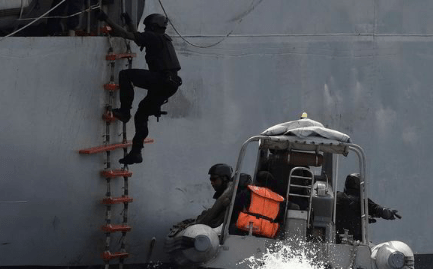The European Union has resolved to take over the security of the Gulf of Guinea (GoG) with the launching of the first pilot case of the Coordinated Maritime Presences (CMP) concept in the region.
This was the outcome of proceedings approved by the EU in a document titled: Council Conclusions on Launching the Pilot Case of the Coordinated Maritime Presences in the Gulf of Guinea’ at its meeting held on 25th January 2021, a copy of which was sighted by SHIPS & PORTS.
The decision by the EU followed the rising number of pirate attacks, kidnapping and armed robberies in the region.
The CMP mechanism aims to increase the EU’s capacity as a reliable partner and maritime security provider, offering greater European operational engagement, ensuring a permanent maritime presence and outreach in maritime areas of interests as established by the Council, and promoting international cooperation and partnership at sea.
According to the document, the EU among other resolutions said its action is to support the West and Central African States in their efforts to address the many challenges to maritime security, including organised crime.
It stated, “In particular, the West and Central African States, which bear the primary responsibility for combating maritime crime in the region, made political commitments already in June 2013 in the code of conduct concerning the repression of piracy, armed robbery against ships, and illicit maritime activity in West and Central Africa.
“These commitments have been pivotal in the progressive establishment of the Yaoundé Architecture to improve coordination and cooperation on maritime security.
“Nevertheless, the Gulf of Guinea continues to face a challenging environment in which piracy, armed robbery at sea, kidnapping of seafarers, illegal, unreported, and unregulated (IUU) fishing, smuggling and trafficking of drugs and arms, as well as transnational organised crime pose a major and increasing threat to maritime security, affecting freedom of navigation, thus endangering major trade routes, jeopardising the sustainable development of the entire region and the economic livelihood of the population, and leading to the deterioration of the environment and biodiversity.”
The EU also reaffirmed its commitment to increasing work with the coastal States of the Gulf of Guinea and the organisations of the Yaoundé Architecture, through greater European operational engagement, by also ensuring continuity, reactiveness, complementarily and synergy between Member States.
“Recalling the EU’s Maritime Security Strategy and the related Action Plan, as well as the EU’s Strategy on the Gulf of Guinea and its related Action Plan, following the Council Conclusions of 17 June 2020, the Council hereby launches the pilot case of the Coordinated Maritime Presences (CMP) concept in the Gulf of Guinea.
“While being distinct from the CSDP missions and operations, the pilot case of this new EU initiative, reflecting the Union’s growing role as a maritime security provider, can provide a substantial contribution to addressing the security challenges in the Gulf of Guinea.
“In this regard, the pilot case of the CMP should allow the EU to: enhance the visibility of EU maritime presence and support the Union’s strategic and political objectives, including conflict prevention, in close cooperation with international and regional partners; promote international cooperation at sea, in line with international law and UNCLOS in particular, and the exchange of information in the maritime security domain in specific areas;- use the CMP as a pragmatic maritime tool as part of the EU’s Integrated Approach.
“In this framework, the Council establishes the Gulf of Guinea as a Maritime Area of Interest (MAI) and welcomes the establishment of the Maritime Area of Interest Coordination Cell (MAICC); recognises the importance for the Member States to further improve the coordination of actions carried out by their assets deployed in the MAI under national command, on a voluntary basis.
“The Council will ensure political control and provide strategic guidance on the implementation of the CMP pilot case;- highlights the importance of enhancing the voluntary sharing of maritime security information among Member States and partners in the CMP pilot case if and when deemed appropriate to improve maritime domain awareness in the MAI; based on lessons learned from the implementation of the CMP concept, the Council will examine the possibility of applying this concept in other maritime areas of EU interest and would revert to the implementation of the pilot case of the CMP concept in the Gulf of Guinea by January 2022,” the document stated.
